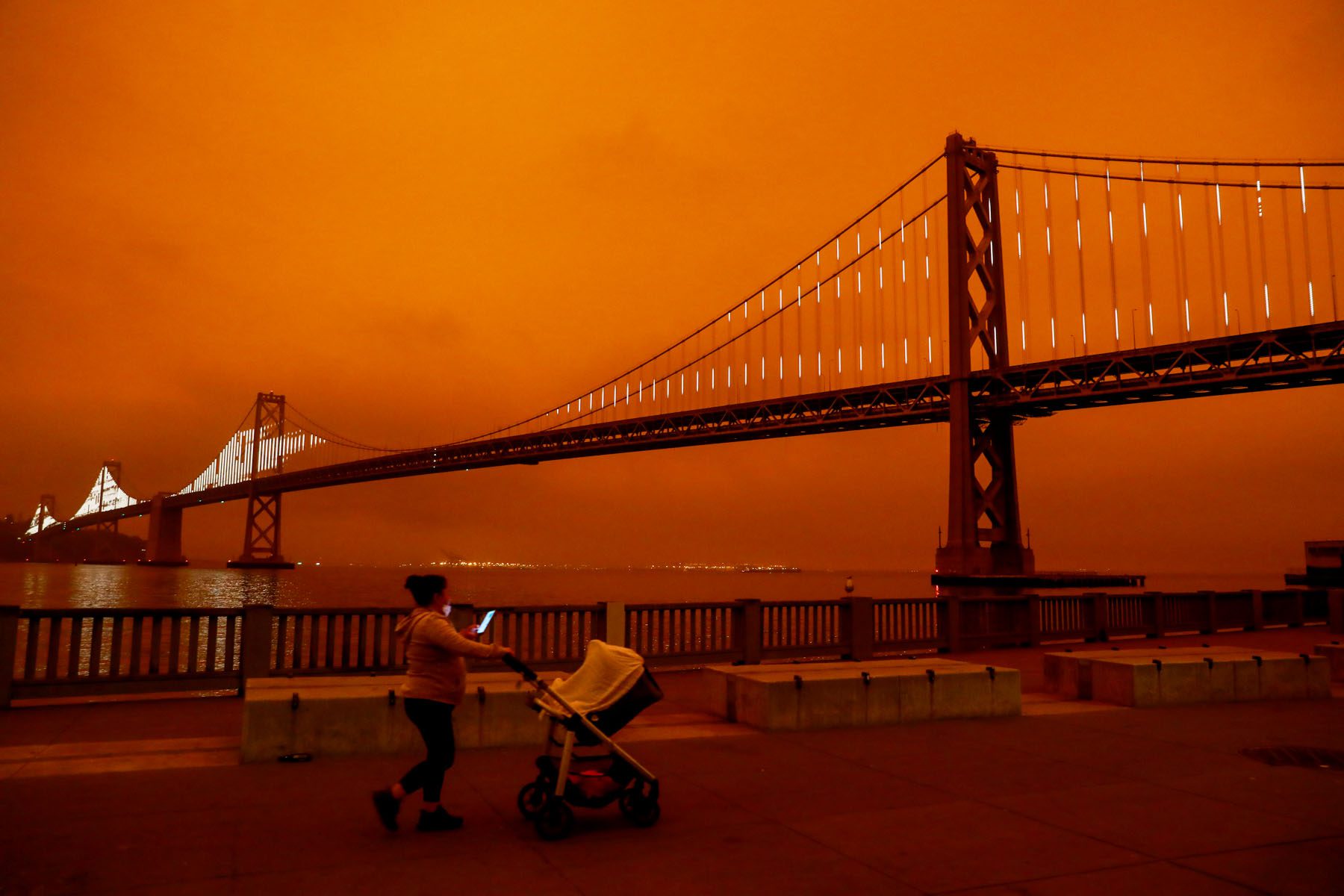In 2020, fast-moving wildfires swept through California, setting houses ablaze and turning the sky an apocalyptic orange. The fires consumed over 4.2 million acres of land — more than double the previous record set in 2018.
Wildfires don’t just barrel through forests and neighborhoods— they pollute the air too: The five highest daily air pollution readings in the state’s history were caused by smoke from the 2020 fires.
This exposure to wildfire smoke and other kinds of particulate matter air pollution, which can be caused by diesel engines and coal-burning power plants, is increasingly being linked to poor health outcomes for pregnant people and their babies. The American Lung Association (ALA) pointed out that fact for the first time in its annual State of the Air report, released Thursday, which analyzed air pollution data for the years 2018-2020. Fires in the West, according to the report, were a large contributor.
“The science shows that they’re at greater risk,” said Laura Kate Bender, the national assistant vice president for healthy air at the ALA. “We know that pregnancy is a susceptible time for the mom and the developing fetus. And we know that there’s clear scientific evidence that ozone and particle pollution can cause low birth weight, premature birth, and other reproductive and developmental harm.”
Other health impacts pointed out by the report include increased infant and fetal mortality, reduced lung development in children and a higher likelihood of childhood asthma.
The report, which examined the impacts of both particle pollution and ozone pollution, found that in 2020 more than 1.5 million pregnancies were recorded in counties that received at least one failing grade for either short-term or long-term particle pollution. It found that of those pregnancies, 210,000 occurred in counties that also failed in ozone pollution levels.
The decision of the ALA to include pregnant people as a vulnerable population in this year’s report is reflective of a growing body of research linking the climate crisis to pregnancy health. Earlier this year, the Intergovernmental Panel on Climate Change, which summarizes the latest climate science, included a new section detailing the ways in which heat waves and other natural disasters are impacting the health of both the pregnant person and the fetus.
A separate study published last year in the journal Environmental Research found that there were as many as 7,000 preterm births in California linked to smoke from wildfires that occurred from 2007 to 2012.
But there are still a lot of unknowns around this field of research, said Amy Padula, an associate professor at the University of California, San Francisco, who researches the impacts of air pollution on pregnancy. Although some studies have drawn conclusions from single wildfire events, Padula is working to better understand how factors like proximity to wildfire smoke or time of exposure during a pregnancy might impact fetal development, as well as expanding the research to analyze health impacts of different kinds of fires.
Prescribed burns, for example, have been seen as a tool to avoid catastrophic wildfires, but we don’t yet understand the risks. “What are the health effects of these different fires?” Padula said. “Is it great enough that we can recommend that at least in terms of pregnant people being exposed to it that we can reduce the effects on adverse birth outcomes by increasing one or decreasing another?”
As wildfire season grows longer and more destructive, the West is quickly becoming the epicenter of air pollution’s deleterious public health impacts, undoing some of the progress made under the Clean Air Act, Bender said.
“We’re seeing this shift, where there’s a growing disparity between eastern and western states in terms of air quality,” she added. According to the report, every county that got a failing grade for annual particle pollution was located in five western states.
Worsening birth outcomes are not the only concern. Jun Wu, a public health professor at the University of California, Irvine has been studying other risks pregnant people might face due to a mix of air pollutants. “What we found is that for women living in areas with higher air pollution, the risk of developing gestational diabetes is higher,” she said. Their babies are also at higher risk of being born preterm.
Her research team established this connection by mapping the addresses of 396,000 pregnant people from 2008 to 2018 and looking at monthly averages of air pollution, using data pulled from EPA air monitoring stations. In southern California one of the major sources of that pollution is traffic, she said. The research was published in the journal Environmental International in October.
Air pollution is not experienced the same by everyone, Bender said: “We found that people of color in this year's report were 61 percent more likely than White people to live in a county with at least one failing grade.”
Industrial uses like landfills and chemical facilities are disproportionately sited in communities of color across the country. It’s just one of many factors that is contributing to the Black pregnancy health crisis.
While populations like pregnant people are deemed “vulnerable” in the report, Padula, the researcher who studies wildfire pollution, said she thinks of that term as a misnomer. “Vulnerable kind of connotes this kind of weakness, which is not the case, right?
“I tend to think of it as more of a preciousness,” she said. It's like there's these populations that we want to be more careful with, you know?”








